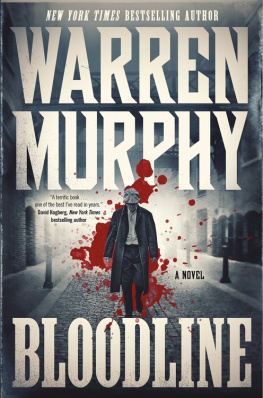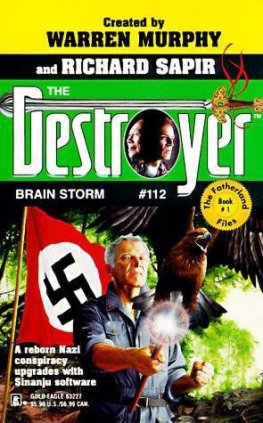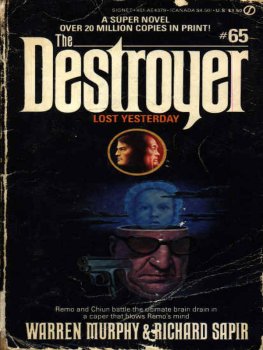Warren Murphy - Cold Warrior
Here you can read online Warren Murphy - Cold Warrior full text of the book (entire story) in english for free. Download pdf and epub, get meaning, cover and reviews about this ebook. genre: Science fiction. Description of the work, (preface) as well as reviews are available. Best literature library LitArk.com created for fans of good reading and offers a wide selection of genres:
Romance novel
Science fiction
Adventure
Detective
Science
History
Home and family
Prose
Art
Politics
Computer
Non-fiction
Religion
Business
Children
Humor
Choose a favorite category and find really read worthwhile books. Enjoy immersion in the world of imagination, feel the emotions of the characters or learn something new for yourself, make an fascinating discovery.

- Book:Cold Warrior
- Author:
- Genre:
- Rating:5 / 5
- Favourites:Add to favourites
- Your mark:
- 100
- 1
- 2
- 3
- 4
- 5
Cold Warrior: summary, description and annotation
We offer to read an annotation, description, summary or preface (depends on what the author of the book "Cold Warrior" wrote himself). If you haven't found the necessary information about the book — write in the comments, we will try to find it.
Cold Warrior — read online for free the complete book (whole text) full work
Below is the text of the book, divided by pages. System saving the place of the last page read, allows you to conveniently read the book "Cold Warrior" online for free, without having to search again every time where you left off. Put a bookmark, and you can go to the page where you finished reading at any time.
Font size:
Interval:
Bookmark:
Destroyer 91: Cold Warrior
By Warren Murphy and Richard Sapir
Prologue
When his mind awoke, his eyes beheld only darkness. But his mind was awake. His brain, long the realm of inchoate nightmares from which there had been no awakening, no refuge, and no surcease, processed conscious thoughts.
When he tried to open his eyes, they refused him. He could feel his lids strain and tug, attempting to separate.
He made a frightened noise deep in his throat, and tasted something plastic along one edge of his thick, dry tongue. His throat felt raw.
Then he sensed presences. Something popped out of his right ear and he heard sounds again. Beeping. A steady hum. An oscilloscope. To his mind leaped the image of an oscilloscope.
"Steady, sir," a youngish voice said.
He grunted inarticulately.
Something came out of his left ear, and the sounds were all around him. There were two of them. They were hovering on either side of the bed on which he lay.
At least, he hoped it was a bed. He could not tell. It felt more like a plush-lined coffin.
Fingers took his chin and separated his jaw. The hinge muscles shot fire into his logy brain and he cried out in agony. But the thing that had obstructed his mouth, the plastic-tasting thing, was no longer there.
"Don't try to speak yet, sir. We're still in the middle of bringing you back."
His mind shot into first gear. Back!
He forced his mouth to make sounds. They sounded horrible, corpsey.
"How . . . long?" he croaked.
"Please, sir. Not yet. Let us finish the procedure."
"Grrrr . . ."
They began unwinding the bandages that sheathed his eyes.
The darkness shaded to gray, then lightened to a pinkish haze in which faint greenish sparks hung, dancing-his optic nerves reacting to the first stimuli in . . . dammit, how long had it been?
"Hmmm," an older voice was saying. "Eyelids are encrusted. Seem welded together."
"I don't see anything in the manual about a procedure covering this," the youngish voice muttered.
"May be a natural phenomenon. We'll leave them. Let the retina get used to stimulation again."
He swallowed. The effort was like ingesting a rough-textured concrete golf ball.
"How . . . long . . . damn . . . it!"
"The briefing officer is on his way, sir. We're physicians."
"Status?"
"Well, your new heart is functioning normally. The animation unit did a good job. Twenty-six beats a minute, like a Swiss clock."
"It was a heart attack, then?"
"You don't remember?"
"No."
"We've had to perform certain other . . . procedures. There was some tissue damage, with resulting loss of function."
"I feel nothing."
"Technically the nerves are still frozen. Feeling will come back. There may be some discomfort."
He said nothing to that.
Then a door clicked open, and he sensed the attending physicians had turned.
"Oh, there you are. He's conscious and responding to our voices, Captain."
"As you were." The new voice was more mature, a strong voice. One he felt he could trust. Not like those wet-behind-the-ears, over-solicitous doctors. Who the hell had hired them, anyway?
"Director, I am Captain Maus."
"Maus. What kind of a name is that?"
"German, sir."
"Go ahead. Report. How long was I . . . inanimate?"
"Let's start with the good news, sir. We currently have thriving bases in California, Florida, Japan, and France. Except for some cultural problems with the French base, expansion is continuing apace."
He absorbed that with a tight smile. The empire flourished! The captain went on.
"In the last few years the Berlin Wall has fallen, the two Germanies have reunited, the Soviet Union has broken up into a chaotic collection of autonomous states with the economic prospects of a landlocked Fiji Islands, and Eastern Europe is free."
He groaned. "That long?"
"It has been a while, Director."
He frowned. "Revenue?"
"Down in the last several quarters. The global economy has been rocky. But we're solidly in the black. There has been no downsizing-"
"Down . . . ?"
"A new business term. It means, um, to lay off staff and cut back expenditures and expansion."
"Why not just say that?"
"Businessmen don't talk that way anymore."
"Humph. With Communism dead, I don't see why they'd hide their light under a bush."
"Actually, Communism isn't exactly dead," said Captain Maus. "The Reds still control China, North Korea-although there is some wild talk of unification there-and other pockets here and there."
"Bring me a map."
"Sir?"
"I want to see this new world."
A doctor's voice: "He's not ready for this yet. The optic nerve has been in utter darkness for . . ."
The doctor's voice trailed off.
"Bring me a map," he repeated harshly.
A map was brought.
"Here it is, sir."
"Someone see to my eyes."
Again the young doctor protested. "I can't allow this. There is no telling what kind of trauma this could cause . . . ."
"Either open my eyes for me, or someone fire that idiot!"
"Yes, sir."
The young doctor's stunned voice protested in bewilderment.
"But, sir, you can't mean . . . I mean, I've been an admirer of yours since I was a boy. You can't mean what you say."
"You're on my payroll. Do your damn job."
The doctors set to work, saying, "We'll try it one eye at a time."
"Just as long you do it."
As they were pouring warm saline solution into his left eye in an attempt to loosen the encrustation there, a question popped into his mind.
"What about Cuba?"
"Sir?"
"Cuba. Is it free?"
"Regrettably, no."
"Who's in charge down there? Anyone I know?" The last was a faint hope, but he wanted something to hold on to. Something familiar.
"Castro, sir."
"Still?"
"He'd old and gray, and they're down to short rations and bicycles, but he's still clinging to power."
"Incredible!"
The other doctor said then, "We think the eye is ready now. We would suggest you take it very slowly."
"Shut up!" he snapped.
And, taking a deep breath, he willed his left eyelid to open a crack.
A white-hot needle of light seared his optic nerve and sent his brain crashing through thunderstorms of pain and shock, and somewhere in the distance he heard their frantic shouts and above them the meek, too-young doctor crying, "I told you so! I told you so! But none of you would listen!"
His last thought before he blacked out again was that he'd have that doctor fired. He had been right in the first place, and therefore should have stood his ground. There would be no place for such weaklings in the new order.
Chapter 1
In the waning weeks of the Thirty-third Year of the Revolution, Xavier Custodio went down to the beach to defend the Revolution for the last time.
In the privacy of his wood and royal palm bohio, he went through his morning routine, not knowing it was to be for the last time. First he dressed in his ragged fatigues, taking them off the clothesline where they had been hung, dripping, the night before. He squirmed into the harness that held the wooden cross snugly on his back. Then he picked up his Sovietmade Kalashnikov rifle-it had begun to rust in the tropical moisture-and a single clip of ammunition.
His machete, which he took from beside the door, was not rusted. It would never rust. Unlike the castoff AK-47, the machete was Cuban. Pre-revolutionary Cuban. It would last Xavier his entire lifetime.
With the machete swinging loose in his hand, he walked into the mangrove thicket and began to hack off a sapling. With absentminded skill, he wormed the thin bole into the back brace, so that the branches formed a canopy over his head. His machete made short work of assorted royal palm fronds and other branches.
Next pageFont size:
Interval:
Bookmark:
Similar books «Cold Warrior»
Look at similar books to Cold Warrior. We have selected literature similar in name and meaning in the hope of providing readers with more options to find new, interesting, not yet read works.
Discussion, reviews of the book Cold Warrior and just readers' own opinions. Leave your comments, write what you think about the work, its meaning or the main characters. Specify what exactly you liked and what you didn't like, and why you think so.



